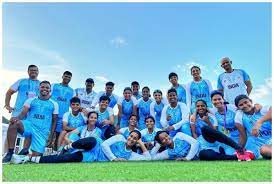HANGZHOU (Reuters): Fringed by forested mountains in eastern China, the Pingfeng campus of Zhejiang University of Technology might seem an unlikely battleground for cricketing powers with Olympic ambitions.
But on Monday it was the focus of much of south Asia as India’s women beat Sri Lanka by 19 runs in the Asian Games final, claiming the nation’s first gold medal in the sport at the continental showpiece.
Propelled by 46 runs from opening batter Smriti Mandhana and 42 from number three Jemimah Rodrigues, India set Sri Lanka 117 for victory and 18-year-old bowler Titas Sadhu took three wickets for six runs to help secure victory in the T20 match.
“I think this is one of the biggest achievements for us as a team,” Rodrigues told Reuters.
“Just to get the gold for the nation and to add to the medals of the nation, I think there’s no bigger prize than that.”
The usually quadrennial Games have been around for over 70 years but cricket only joined the programme at the 2010 edition in the southern Chinese city of Guangzhou.
Though returning at the 2014 Games in Incheon, South Korea, it was dropped from Jakarta in 2018.
Having not sent a team to Guangzhou or Incheon, powerhouse India’s snubbing of the tournament was often blamed for the Jakarta miss.
Yet no-one can accuse India of lacking enthusiasm now, with the country sending a strong women’s squad to Hangzhou and a men’s outfit as well despite a scheduling clash with the 50-over World Cup starting on home soil next week.
India’s presence has been a coup for Hangzhou, ensuring a sizeable chunk of the subcontinent’s population tune in.
A big Indian press pack was present to cover the women’s final and a parade of the country’s officials, including government and Olympic executives, filtered into the venue as their team began batting in the first innings.
Unlike Asia’s other populous giant China, India have never made much of a splash at the Olympics, their seven-medal haul at the Tokyo Games a record for the nation.
Adding cricket to the Olympic programme — as is expected for the 2028 Los Angeles Games — could help boost the tally.
“It certainly looks like it could go to the Olympics. And why not?” Indian Olympic Association executive member Amitabh Sharma told Reuters before the women’s final.
“When we talk about China hosting the Asian Games and cricket being here, it’s good for the sport.”
It could also be good for the Olympics as well, which has seen viewership numbers in key markets, including the United States, plunge in recent events.
Cricket might help boost interest in the Olympics in south Asia, a region which has traditionally been lukewarm about the world’s biggest sporting event.
Global cricket officials, meanwhile, will hope Hangzhou’s Asian Games tournament might help raise the sport’s profile in China, where it has never caught on.
With a roofed grandstand for a few hundred spectators behind the wicket and a big digital scoreboard showing scores and replays, organisers spared little expense to host the tournament to international standard.
A few local sports journalists covered the tournament but several admitted to being sketchy on aspects of the game.
The Zhejiang University of Technology intends to keep the cricket ground, having introduced the sport into its curriculum this year.
Chinese fans in the crowd got into the spirit on a steamy afternoon, cheering every time the batters smashed the ball to the boundary.
Cricket’s entry into the Olympics would give it more cachet among Games-loving Chinese officials and likely bring a funding boost.
It would also inspire India’s women to chase another medal, having also won silver at last year’s Commonwealth Games in Birmingham.
“Hopefully, I think that’s the next step for cricket, I guess,” Mandhana told Reuters.
“We’ve had Commonwealth in women’s cricket, now the Asian Games and the next Olympics, hopefully it happens.”







